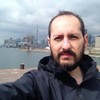All images courtesy of 'City 40'
Advertisement
Samira Goetschel: We stayed outside of the city for a few days. It's a huge forest right outside. And we were looking around to see if there was a way we could just sneak in, but it was impossible. It was just absolutely impossible. You know, it's double barbed-wire fences, it's heavily guarded, and so you can't get in basically. And I immediately figured out that we need help from the inside. They know that they cannot talk to anybody from the outside. Anybody on the outside is an enemy. And it's not just the foreigners, but also the Russians who live outside of the city. So this mentality of being paranoid, it's still very much there. And I wanted to see if these people would talk to me. I just jumped in. And they took me in, and they started talking.
Advertisement
In order for these people to remain—they weren't going to escape anyway—but just to make sure that they are happy to be there, [the government] created a paradise for them. So they had everything they possibly needed and more in comparison to the outside world where they had absolutely nothing. And they were not placed on any map, they were a state within a state. Their identities were erased. They did not exist outside of the city.And to me it was basically like I'd entered an episode of the Twilight Zone. It's as if these people were not living in this dimension.So to me this was so fascinating that you immediately stopped as a filmmaker or journalist or whatever, you immediately stop judging.
What sort of freedoms that we enjoy in the West do these people in City 40 not have available to them?
They have nothing available to them. They can't leave. For the first eight years of course they were not allowed to leave. The most basic fundamental freedom that we have is freedom of movement. These are unalienable rights that we have, we are born with these rights and these people don't have it and they don't even have the concept that this is against their rights. And if you leave the city now you have to get exit visas for specific days that you can go or specific hours that you can go out and go to specific places. But these people they live in a town, they cannot leave and they say, you know, their rights are not violated—and so for them, that's their universe.
Advertisement
What I'm hoping to achieve with this film is exactly what you're talking about. I had a lot of struggle trying to tell the story right because I had promised them, because they risked their life to tell me the story. You know the Russians have been presented and represented by the media and Hollywood and the government and everybody as either victims or mafia. You have never really heard their voice, so I decided, OK, let them talk for themselves. Let the audience connect and identify with them, you know, through their stories and let the audience share that experience so that they understand their reality.
They are exposed to radiation, long term and short term radiation In the beginning—and they're doing it still—they were dumping their radioactive waste into the environment, whether it was the lakes, the ground and into the air. There's one specific lake that is so contaminated by plutonium that it's actually called the plutonium lake by the locals themselves.And there is a sign right there and it's just for them. It says "No Trespassing" because two hours by the lake, you'll die. So if you see this lake, the Ontario Lake right here. By now we would have been dead. The rate of cancer is enormous and their kids are born with cancer. They die with cancer. But they take it as part of life.
Advertisement
Nadia was born in the city, raised there, she married there and she has four kids. And in the beginning like everybody else you know she thought this is a great city, it's paradise. But slowly when she actually learned about what is happening to the environment, to their rights and everything else she started asking questions. You need to remember, you cannot ask questions.So the authorities who run the city, they know what she's doing. But the moment that she actually took the story and put it on the global map, started talking to people like me, then she got in huge trouble. She was persecuted by the local authorities. The FSB, which replaced the KGB, they're Russian secret police. She got in so much trouble with them.You don't talk and when you talk that means you have betrayed. You have betrayed your city, you have betrayed your country and you have betrayed the motherland. And the motherland is everything.
Humongous, huge risks. So for instance you'll see in the film what happens to Nadia. But in terms of those people who actually are still in the city, I've lost my contact with them. I mean, this is life threatening what they've done. I can't talk actually about this but they have risked their lives by breaking their silence. They've betrayed Mother Russia by talking to an outsider.
They did so willingly because basically they thought to themselves, "We're dying anyway." These are the people who understood what was happening, "We are dying anyway. We might as well tell our story and tell the outside world what is happening to us here," because 80 percent of the people inside don't even realize what is happening.Follow Tomas Urbina on Twitter.
